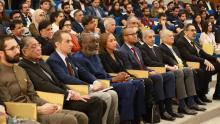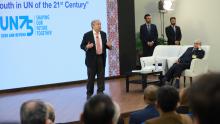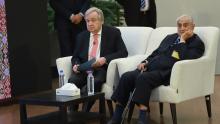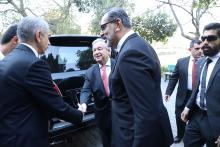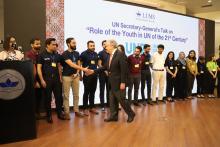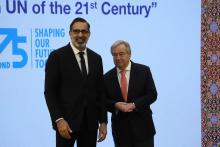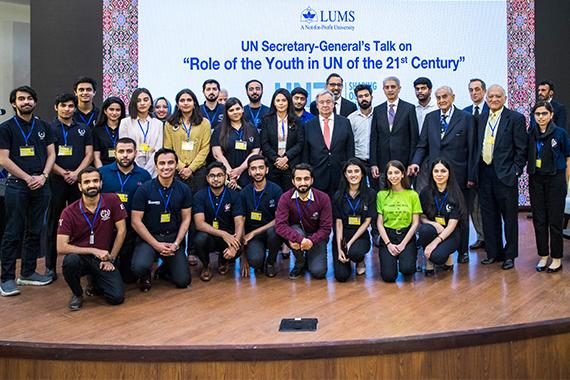
To promote the values of peace, justice and tolerance, His Excellency António Guterres, the ninth Secretary-General of the United Nations (UNSG), at a ceremony hosted by LUMS on February 18, 2020 met and exchanged ideas with the Pakistani youth. Welcoming him on campus were the Vice Chancellor LUMS, Dr. Arshad Ahmad; Rector, Mr. Shahid Hussain, and senior management of the University. Also present were Founding Pro Chancellor, Syed Babar Ali; Member Board of Trustees, Dr. Parvez Hassan, and LUMS alumni.
Senior representatives and students from Kinnaird College for Women, University of Education and Shalamar Nursing College were also present. In addition, representatives from the University of Management and Technology, Minhaj University Lahore, Qarshi University, Virtual University, and Ali Institute attended the event.
Mr. Guterres took office as UNSG on January 1, 2017. He served as United Nations High Commissioner for Refugees (UNHCR) from June 2005 to December 2015 before which he served as Prime Minister of Portugal from 1995 to 2002.
His visit was part of the UN75 Dialogues, a campaign launched to mark the UN’s 75th anniversary in 2020, which aims to ignite a global conversation about the kind of future we need and how different stakeholders can come together to realise a better world by 2045, the UN’s 100th birthday.
In his keynote address titled, ‘Role of the Youth in United Nations of the 21st Century’, Mr. Guterres addressed a packed audience, which largely comprised of students and faculty from LUMS as well as other universities and colleges in Lahore. He acknowledged that the youth of today are battling enormous challenges including conflict, displacement, a shrinking civic space, economic uncertainty as well as the impact of climate change and thus to create a more peaceful, sustainable and prosperous world, the youth need to lead.
“What we want with the 75th anniversary is to move into the age of participation, which means not only to listen to young people but to make their voice and participation count in the way decisions are made, in which strategies are established, policies are defined and actions are implemented. This in my opinion is absolutely essential,” stressed Mr. Guterres.
A vocal proponent for empowering the youth, Mr. Guterres in 2018, launched ‘Youth2030: The United Nations Strategy on Youth’, a campaign that aims to help create a world in which the human rights of every young person are protected and they are given opportunities to achieve their full potential as agents of change.
To achieve this, the UN, Mr. Guterres said, is working to create spaces where the youth have a larger part to play in development programmes, contribute meaningfully in peace negotiations, and are empowered to herald change in their local communities as well as on international platforms. They, he explained, display a sense of optimism, which is an extremely important basis to build a future.
Also a champion for the cause of climate change, Mr. Guterres underscored the importance of timely action to mitigate and reverse the threat of climate change. “Even today we do not have enough political will to take the decisions that are necessary to reverse the climate emergency in which we live. It is the youth who are leading movements around the world to make leaders and politicians accountable on this front. We want to establish within the UN mechanisms of institutional dialogue and participation, allowing the youth to have an influence in the way the UN shapes its interventions, its decisions and its strategies,” he shared.
Vice Chancellor, Dr. Arshad Ahmad welcomed Mr. Guterres and spoke about the significance of his visit in helping reshape Pakistan’s role in global conversations. Young Pakistanis, he said, too support the causes that Mr. Guterres holds dear. “The youth of Pakistan are with you in combatting global warming and living with our neighbours in peace,” he said.
“The youth do not resemble the stereotypes the world has of them”, he added. “Our message to the world is that it must recognise young Pakistanis for who they are. It is a message that we must not underestimate their potential…. Rather, they feel safer and better off than their parents do; they vote more than adults anywhere, and collectively speak 77 languages, which speaks to their diversity. Our youth make the extraordinary ordinary,” added Dr. Ahmad.
Sundas Noor Aslam, a BSc Humanities and Social Sciences student at LUMS, also addressed the audience on behalf of the youth. “We as the youth of today need to nurture and care for our natural heritage so that it can be saved from the devastation of the ongoing cycle of climate change. Our generation has been given a fragile earth; the burden is heavy on our shoulders. We will need to make some very important choices in terms of survival of ourselves as species, as humans.”
Mr. Guterres engaged with the audience and welcomed suggestions as to how the role of the UN should change in the future. He is on a visit to Pakistan to participate in the international conference, ‘40 Years of Afghan Refugees Presence in Pakistan: A New Partnership for Solidarity’, in recognition of Pakistan’s continued hospitality to one of the largest refugee populations in the world.
